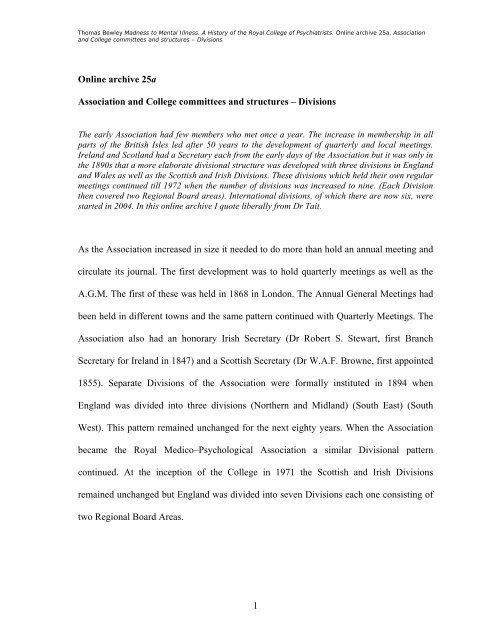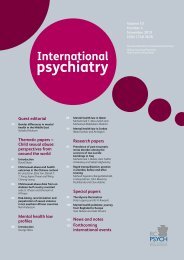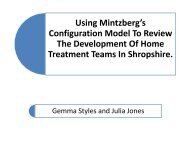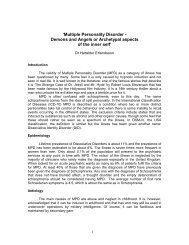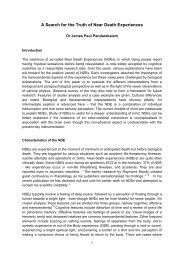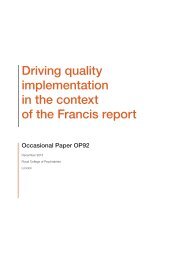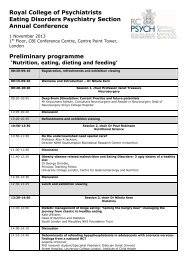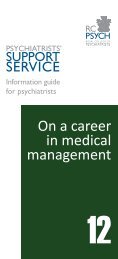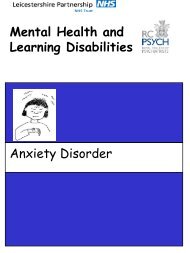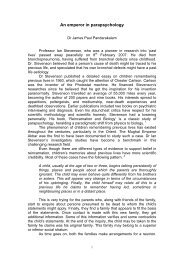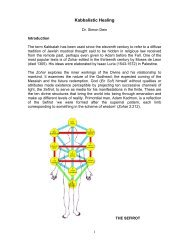Divisions - Royal College of Psychiatrists
Divisions - Royal College of Psychiatrists
Divisions - Royal College of Psychiatrists
Create successful ePaper yourself
Turn your PDF publications into a flip-book with our unique Google optimized e-Paper software.
Thomas Bewley Madness to Mental Illness. A History <strong>of</strong> the <strong>Royal</strong> <strong>College</strong> <strong>of</strong> <strong>Psychiatrists</strong>. Online archive 25a, Association<br />
and <strong>College</strong> committees and structures – <strong>Divisions</strong><br />
Online archive 25a<br />
Association and <strong>College</strong> committees and structures – <strong>Divisions</strong><br />
The early Association had few members who met once a year. The increase in membership in all<br />
parts <strong>of</strong> the British Isles led after 50 years to the development <strong>of</strong> quarterly and local meetings.<br />
Ireland and Scotland had a Secretary each from the early days <strong>of</strong> the Association but it was only in<br />
the 1890s that a more elaborate divisional structure was developed with three divisions in England<br />
and Wales as well as the Scottish and Irish <strong>Divisions</strong>. These divisions which held their own regular<br />
meetings continued till 1972 when the number <strong>of</strong> divisions was increased to nine. (Each Division<br />
then covered two Regional Board areas). International divisions, <strong>of</strong> which there are now six, were<br />
started in 2004. In this online archive I quote liberally from Dr Tait.<br />
As the Association increased in size it needed to do more than hold an annual meeting and<br />
circulate its journal. The first development was to hold quarterly meetings as well as the<br />
A.G.M. The first <strong>of</strong> these was held in 1868 in London. The Annual General Meetings had<br />
been held in different towns and the same pattern continued with Quarterly Meetings. The<br />
Association also had an honorary Irish Secretary (Dr Robert S. Stewart, first Branch<br />
Secretary for Ireland in 1847) and a Scottish Secretary (Dr W.A.F. Browne, first appointed<br />
1855). Separate <strong>Divisions</strong> <strong>of</strong> the Association were formally instituted in 1894 when<br />
England was divided into three divisions (Northern and Midland) (South East) (South<br />
West). This pattern remained unchanged for the next eighty years. When the Association<br />
became the <strong>Royal</strong> Medico–Psychological Association a similar Divisional pattern<br />
continued. At the inception <strong>of</strong> the <strong>College</strong> in 1971 the Scottish and Irish <strong>Divisions</strong><br />
remained unchanged but England was divided into seven <strong>Divisions</strong> each one consisting <strong>of</strong><br />
two Regional Board Areas.<br />
1
Thomas Bewley Madness to Mental Illness. A History <strong>of</strong> the <strong>Royal</strong> <strong>College</strong> <strong>of</strong> <strong>Psychiatrists</strong>. Online archive 25a, Association<br />
and <strong>College</strong> committees and structures – <strong>Divisions</strong><br />
THE SCOTTISH DIVISION<br />
The Divisional structure in the Association and <strong>College</strong> is best exemplified with an<br />
account <strong>of</strong> the Scottish Division (Tait, 1992). In 1854 there was a suggestion to form a<br />
Branch Association in Scotland which was approved but not implemented. The following<br />
year Dr W.A.F. Browne was appointed Honorary Secretary for Scotland (Dr Browne later<br />
became the first President <strong>of</strong> the renamed Medico–Psychological Association in 1866). Dr<br />
Skae, the father <strong>of</strong> Edinburgh Psychiatry, was the first Scottish psychiatrist to be President<br />
<strong>of</strong> the early Association in 1863. The first A.G.M. <strong>of</strong> the Association to be held in Scotland<br />
had taken place under the Presidency <strong>of</strong> John Connolly in 1858. In September 1869 Dr<br />
John Batty Tuke <strong>of</strong> Cupar (later to be knighted as a politician) announced that, ‘it is the<br />
wish <strong>of</strong> the members <strong>of</strong> the Medico–Psychological Association resident in Scotland and<br />
the North <strong>of</strong> England to hold a meeting at Edinburgh…for the purpose <strong>of</strong> organising a<br />
Branch Association on the same basis as the one now working in London.’ This proposal<br />
was stimulated by the preceding 1868 meeting in London, when it was suggested that<br />
regular quarterly as well as annual meetings be held, and that two <strong>of</strong> these should be in<br />
Scotland or the North. In 1869 an Edinburgh meeting was held, and it was minuted that<br />
those present ‘resolve themselves into a Branch Association, always under the Medico–<br />
Psychological Association, with a view to having special meetings <strong>of</strong> those members who<br />
reside in Scotland and the North <strong>of</strong> England, and others who may choose to attend.’ Such a<br />
resolution had to be acceptable to the Association, and the then President was consulted as<br />
to its legitimacy and propriety. The President was Dr Thomas Laycock, Pr<strong>of</strong>essor <strong>of</strong> the<br />
Practice <strong>of</strong> Physic at Edinburgh University, and he assured the members that the plan was<br />
permissible. He appears to have anticipated the decision, attending in that year the Lord<br />
2
Thomas Bewley Madness to Mental Illness. A History <strong>of</strong> the <strong>Royal</strong> <strong>College</strong> <strong>of</strong> <strong>Psychiatrists</strong>. Online archive 25a, Association<br />
and <strong>College</strong> committees and structures – <strong>Divisions</strong><br />
Advocate concerning mentally defective criminals, and leading a deputation from ‘the<br />
Scottish Branch <strong>of</strong> the Association’. A second, largely scientific, meeting was held in<br />
Glasgow the following spring.<br />
The number and vigour <strong>of</strong> meetings varied over the years, with secretaries recording their<br />
traditional complaints. Even in the 1900s one wrote , ‘It is always a great difficulty getting<br />
papers for the meeting’, and the plaintive, ‘I have not received replies to my postcard from<br />
a great number <strong>of</strong> members’. At the turn <strong>of</strong> the century meetings were more frequently<br />
held in asylums, rather than centrally. This was to be recurrently advocated even as late as<br />
1932 when the then Dr David Henderson moved that future meetings should be held ‘in<br />
varying parts <strong>of</strong> the country, and that these meetings be <strong>of</strong> a whole day nature, so that<br />
adequate time is provided for the discussion <strong>of</strong> both business and scientific subjects’. This<br />
was unanimously carried.<br />
The Division’s announced functions were the advancement <strong>of</strong> knowledge <strong>of</strong> mental illness,<br />
and improving the treatment and care <strong>of</strong> the afflicted. In pursuing these aims the Scottish<br />
Division, a small body, was sometimes able to act formally under its own flag; but <strong>of</strong>ten<br />
individual members grouped together, and the intentions were realized through larger and<br />
more influential bodies, the established <strong>College</strong>s and the Universities. In Scotland<br />
psychiatry, represented by the Division and its members, probably had a closer relationship<br />
with mainstream medicine and the academic world than in some other parts <strong>of</strong> Britain. The<br />
Scottish members <strong>of</strong> the Association were always involved in direct representations to<br />
<strong>of</strong>ficial bodies, on behalf <strong>of</strong> their patients. In the middle 1850s there was a Governmental<br />
3
Thomas Bewley Madness to Mental Illness. A History <strong>of</strong> the <strong>Royal</strong> <strong>College</strong> <strong>of</strong> <strong>Psychiatrists</strong>. Online archive 25a, Association<br />
and <strong>College</strong> committees and structures – <strong>Divisions</strong><br />
enquiry into the care and legal status <strong>of</strong> lunatics in Scotland to which distinguished<br />
colleagues like Skae and Browne gave evidence; and the 1857 Lunacy (Scotland) Act,<br />
which established the Board <strong>of</strong> Control, was only the first <strong>of</strong> many statutory proposals and<br />
measures to whose ideas and drafting the members gave detailed comment and criticism.<br />
At the 1869 meeting there was a recommendation that wards be provided in the new<br />
Edinburgh <strong>Royal</strong> Infirmary ‘for teaching purposes’. This did not succeed, and was watered<br />
down to a resolution addressed to Universities and the General Medical Council that<br />
teaching in insanity, and examination thereon, should be imperative in any medical<br />
curriculum. It was only in 1888 that the GMC suggested this was desirable, and five years<br />
later it was made compulsory. Postgraduate education by the Division, pending the much<br />
later establishment <strong>of</strong> academic training courses, was carried out mainly by the<br />
presentation and discussion <strong>of</strong> cases and investigations.<br />
The Division was interested in research. In 1896 the Central Pathological Laboratory was<br />
founded, located in Edinburgh, supervised by a Special Board, elected by the<br />
Superintendents, with a view to conducting research and examining pathological material.<br />
This institution was to continue for several decades, with some duplication elsewhere – as<br />
in the West <strong>of</strong> Scotland Neuropsychiatric Institute. In the Laboratory’s research, and in its<br />
publications, there was some concentration on brain pathology, on infections, on theories<br />
<strong>of</strong> auto-intoxication, and on vaccines. As well as studies <strong>of</strong> that type, the Division<br />
recurrently tried to mount general enquiries <strong>of</strong> its membership. In 1895 Dr George<br />
Robertson suggested a Committee on Collective Investigation: to propose subjects, to<br />
4
Thomas Bewley Madness to Mental Illness. A History <strong>of</strong> the <strong>Royal</strong> <strong>College</strong> <strong>of</strong> <strong>Psychiatrists</strong>. Online archive 25a, Association<br />
and <strong>College</strong> committees and structures – <strong>Divisions</strong><br />
circulate these for criticism and to render uniform the methods <strong>of</strong> inquiry. The first enquiry<br />
was to be on Statistics and Types <strong>of</strong> Epileptic Insanity. It was later, as a <strong>College</strong> Division,<br />
that collaborative studies, from member groups in the Division flourished on, for example,<br />
first episode schizophrenia, or the condition <strong>of</strong> long-stay patients.<br />
Following the 1939-1945 War that Scottish special interest sections and groups were<br />
established in research, child psychiatry, learning disability, forensic psychiatry,<br />
psychotherapy, old age, and rehabilitation and management. These sections also concerned<br />
themselves with medico-political matters.<br />
The advent <strong>of</strong> the National Health Service meant an enormous expansion <strong>of</strong> the Division’s<br />
medico-political role, in both responding to Governmental consultation papers and<br />
developing their increasingly detailed suggestions and plans. In 1969 a memorandum on<br />
the ‘Development <strong>of</strong> Area Mental Health Services in Scotland’ was composed; in 1971 a<br />
memoranda on ‘Doctors in an Integrated Health Service’; and in 1973 an 80-page detailed,<br />
uninvited and widely circulated statement on ‘The Future <strong>of</strong> Psychiatric Services in<br />
Scotland’. Since then there has been a multitude <strong>of</strong> working groups and subcommittees,<br />
sometimes Division based, sometimes Governmentally sponsored with invited or<br />
nominated members from the Division. This places a considerable burden on committee<br />
members, and others. Scotland, with its own distinctive law, its own Health Department,<br />
its many statutory and voluntary institutions <strong>of</strong> entirely Scottish character, probably<br />
requires as much consultation with and input from the Division, as England. The Scottish<br />
5
Thomas Bewley Madness to Mental Illness. A History <strong>of</strong> the <strong>Royal</strong> <strong>College</strong> <strong>of</strong> <strong>Psychiatrists</strong>. Online archive 25a, Association<br />
and <strong>College</strong> committees and structures – <strong>Divisions</strong><br />
Division now awards two prizes for trainees in Scotland, the McHarg and the Margaret<br />
Methven Prize.<br />
THE IRISH DIVISION<br />
A single meeting <strong>of</strong> the Irish Division can give an example <strong>of</strong> Divisional meetings which<br />
provided opportunities for colleagues to meet. They generally took place at a mental<br />
hospital (Asylum) when papers would be given followed by discussion. This included<br />
medico-political and administrative matters. Reports <strong>of</strong> all the Divisional meetings were<br />
given in the Association Journal initially and later in the Notes and News Section.<br />
A summer meeting <strong>of</strong> the Irish Division was held at the District Asylum Kilkenny in July<br />
1906. Dr G.F. West, Physician Superintendent, occupied the Chair and there were also<br />
present Drs. C. Norman, A. Fitzgerald, T. Drapes, and W.R. Dawson (Hon.Sec.), as well as<br />
Dr L. Buggy, who was present as a visitor. The minutes <strong>of</strong> the previous meeting having<br />
been read, confirmed, and signed, the Hon. Secretary reported with reference to various<br />
matters therein contained, and a short informal discussion took place. Letters from Mrs.<br />
Molony and Dr Oscar Woods relative to resolutions <strong>of</strong> condolence passed at the last<br />
meeting <strong>of</strong> the Division were read. It was decided to hold the next meeting <strong>of</strong> the Division<br />
at the <strong>Royal</strong> <strong>College</strong> <strong>of</strong> Physicians, Dublin.<br />
Dr G.F. WEST contributed a ‘Note on Kilkenny Asylum.’<br />
DR CONOLLY NORMAN made a communication on ‘An Ancient Form <strong>of</strong> Physicians’<br />
Register,’ which he exhibited.<br />
6
Thomas Bewley Madness to Mental Illness. A History <strong>of</strong> the <strong>Royal</strong> <strong>College</strong> <strong>of</strong> <strong>Psychiatrists</strong>. Online archive 25a, Association<br />
and <strong>College</strong> committees and structures – <strong>Divisions</strong><br />
A short discussion followed, in which most <strong>of</strong> those present joined, and the meeting<br />
terminated.<br />
This account <strong>of</strong> a Divisional Meeting gives some idea <strong>of</strong> the local activities <strong>of</strong> a Division.<br />
Four years later the obituary <strong>of</strong> Dr Conolly Norman who gave the second presentation at<br />
this meeting drew attention to some <strong>of</strong> the other activities. When Dr Conolly Norman was<br />
President and the whole Association came to Dublin they were lavishly and hospitably<br />
entertained. His obituary also drew attention to one <strong>of</strong> the problems facing doctors in<br />
charge <strong>of</strong> asylums, the outbreaks <strong>of</strong> physical illness among asylum inmates which were not<br />
understood at the time. In Dr Conolly Norman’s case a vitamin B deficiency disease, Beriberi.<br />
This account <strong>of</strong> a single meeting <strong>of</strong> a remote division <strong>of</strong> the Association should give<br />
some idea <strong>of</strong> the interests and activities <strong>of</strong> psychiatrists at the time and what was being<br />
done for patients. The psychiatrists were administrators and the patients were housed,<br />
clothed and fed. Their activities were on the farm or in housework (laundry, kitchen). Dr<br />
Conolly Norman’s pre-First World War obituary shows a little <strong>of</strong> what they could, and<br />
could not do, and the way they liked to see themselves.<br />
The Irish Division <strong>of</strong> the MPA became the Irish Division <strong>of</strong> the RMPA in 1926 and <strong>of</strong> the<br />
<strong>College</strong> in 1971. At that time it consisted <strong>of</strong> all members in Ireland. For many years a<br />
Fellow and Member from the South and a Fellow and Member from the North were the<br />
Irish Division representatives on the <strong>College</strong> Council. The chairman changed every two<br />
years alternating between one from the South and one from the North. The secretaries<br />
similarly came from the North and South in turn. There were problems for the psychiatrists<br />
7
Thomas Bewley Madness to Mental Illness. A History <strong>of</strong> the <strong>Royal</strong> <strong>College</strong> <strong>of</strong> <strong>Psychiatrists</strong>. Online archive 25a, Association<br />
and <strong>College</strong> committees and structures – <strong>Divisions</strong><br />
in the South as the Department <strong>of</strong> Health did not wish to take advice from a British <strong>Royal</strong><br />
<strong>College</strong>. For this reason the members <strong>of</strong> the Committee <strong>of</strong> the Division in the South for a<br />
time called themselves the Irish Association <strong>of</strong> <strong>Psychiatrists</strong> and all members in the South<br />
became simultaneously members <strong>of</strong> the <strong>College</strong> and the Association. A few Southern Irish<br />
members thought they ought to form an Independent <strong>College</strong> <strong>of</strong> their own but the<br />
realization that premises would be expensive and a fear on the part <strong>of</strong> trainees that their<br />
education/training might not be accepted for the MRCPsych meant that this suggestion<br />
never got <strong>of</strong>f the ground.<br />
A further change came about in October 2002. The Irish Division had developed two<br />
sections, the Irish Section and the Northern Ireland Section and the Irish Section adopted<br />
the name the Irish <strong>College</strong> <strong>of</strong> <strong>Psychiatrists</strong> (Coláiste Siciatraithe na h’Éireann) as their<br />
business name. Both the Northern Ireland Section and the Irish <strong>College</strong> had representations<br />
on the Executive and Finance Committee. The Irish <strong>College</strong> <strong>of</strong> <strong>Psychiatrists</strong> was<br />
established in this form in 2002 responding to the need for a stronger identity for the<br />
pr<strong>of</strong>ession in Ireland. This had implications for the Northern Ireland Section <strong>of</strong> the Irish<br />
Division which then became a division in its own right. In order to continue the<br />
harmonious relationship between psychiatrists in the North and South the All-Ireland<br />
Institute <strong>of</strong> Psychiatry was set up in 2003 to act as the body to serve the joint interests <strong>of</strong><br />
the Irish <strong>College</strong> <strong>of</strong> <strong>Psychiatrists</strong> and the Northern Ireland Division <strong>of</strong> the <strong>College</strong> for the<br />
whole <strong>of</strong> Ireland. Administrative, educational and medico-political tasks had been<br />
increasing since the 1970s and in 1994 an <strong>of</strong>fice <strong>of</strong> the <strong>College</strong> was opened in Dublin,<br />
based at hospital premises at Stillorgan Dublin. An administrator was appointed and<br />
8
Thomas Bewley Madness to Mental Illness. A History <strong>of</strong> the <strong>Royal</strong> <strong>College</strong> <strong>of</strong> <strong>Psychiatrists</strong>. Online archive 25a, Association<br />
and <strong>College</strong> committees and structures – <strong>Divisions</strong><br />
business was put on a more formal footing. The <strong>of</strong>fice premises moved to St. Stephen’s<br />
Green in 1998. The Northern Ireland Division also acquired premises and an administrator.<br />
Northern Ireland was developing new mental health legislation and the Division worked<br />
actively to influence it. They were also proactively linking in with the Northern Ireland<br />
Assembly.<br />
THE ENGLISH DIVISIONS<br />
After 1897 England was divided into three regions:<br />
1. Northern Division included Cheshire, Cumberland, Derby, Durham, Lancashire,<br />
Leicester, Lincoln, Northumberland, Nottingham, Shropshire, Stafford, Warwick,<br />
Westmoreland, York, and North Wales.<br />
2. South- Western included Berks, Cornwall, Devon, Dorset, Gloucester, Hants,<br />
Hereford, Oxford, Somerset, Wilts, Worcester, and South Wales.<br />
3. South-Eastern included Bucks, Cambridge, Essex, Herts, Kent, London,<br />
Middlesex, Norfolk, Northampton, Suffolk, Surrey, and Sussex.<br />
.<br />
9
Thomas Bewley Madness to Mental Illness. A History <strong>of</strong> the <strong>Royal</strong> <strong>College</strong> <strong>of</strong> <strong>Psychiatrists</strong>. Online archive 25a, Association<br />
and <strong>College</strong> committees and structures – <strong>Divisions</strong><br />
The Boundaries <strong>of</strong> the Region were shown in a map in the Journal in October 1897.<br />
Notes and News<br />
[Oct.,1897]<br />
OUtLINE MAP OF DIVISIONS<br />
The Boundaries <strong>of</strong> the Division remained unchanged until the Inception <strong>of</strong> the <strong>College</strong> in<br />
1971. It was decided that two contiguous Regional Board Areas would form the new<br />
10
Thomas Bewley Madness to Mental Illness. A History <strong>of</strong> the <strong>Royal</strong> <strong>College</strong> <strong>of</strong> <strong>Psychiatrists</strong>. Online archive 25a, Association<br />
and <strong>College</strong> committees and structures – <strong>Divisions</strong><br />
<strong>Divisions</strong>. The new Divisional structure consisted <strong>of</strong> the Scottish, Irish and Welsh<br />
<strong>Divisions</strong> and seven separate English <strong>Divisions</strong> [North East; North West; Midlands; South<br />
Western; Chiltern and Thames Valley; East Anglian; Southern].<br />
The pattern <strong>of</strong> activities <strong>of</strong> the Division was similar to the pattern described for Scotland<br />
with regional meetings, <strong>of</strong>ten at a mental hospital. The papers given at regional meetings<br />
could be published in the Journal and the minutes <strong>of</strong> these meetings were published in the<br />
Association’s ‘Notes and News’. The Divisional structure was again reorganised in 1995 in<br />
order to have <strong>College</strong> <strong>Divisions</strong> that would be contiguous with National Health Service<br />
Regions making eight <strong>Divisions</strong> in England as well as the Scottish, Irish and Welsh<br />
<strong>Divisions</strong>. A short account <strong>of</strong> the Trent Division can serve as a paradigm for the other<br />
English <strong>Divisions</strong>. Devolution led to great changes for Wales, Scotland and Ireland.<br />
The Trent Division started in 1997. Its predecessors dated back to 1894. The interest <strong>of</strong> the<br />
Midlands was taken care <strong>of</strong> by the Northern and Midland Division, which began in 1897.<br />
The Midland Division (the immediate predecessor to the Trent Division) started<br />
functioning in 1972. The Midland Division covered the geographical area covered by the<br />
West Midland and Trent Regional Offices <strong>of</strong> the NHS and as a protocol, it was accepted<br />
that the Office bearers <strong>of</strong> the Division alternated between the two Regions and usually the<br />
Chair and the Honorary Secretary did not work in the same Region. The Executive<br />
Committee and the Divisional meetings were held at different locations alternating<br />
between the two Regions. It worked well. When the NHS was reorganised in 1997 the<br />
Council approved changes to the Divisional boundaries to be co terminus with the area<br />
covered by the Regional Offices <strong>of</strong> the newly defined NHS Executive. The Trent Division<br />
11
Thomas Bewley Madness to Mental Illness. A History <strong>of</strong> the <strong>Royal</strong> <strong>College</strong> <strong>of</strong> <strong>Psychiatrists</strong>. Online archive 25a, Association<br />
and <strong>College</strong> committees and structures – <strong>Divisions</strong><br />
worked very closely with the Trent NHS (E) and held successful annual joint meetings to<br />
discuss and debate issues <strong>of</strong> clinical importance. By then the Speciality Advisory<br />
Committees (<strong>of</strong> which Psychiatry was one) to the Regional Offices were dismantled thus<br />
leaving little or no room for Clinicians and Regional Officers to exchange ideas. Hospital<br />
Trusts were formed with almost total local control and management, with monitoring being<br />
one <strong>of</strong> the briefs given to the Regional Executives. The Trent Division was unique in that<br />
only one Regional Adviser <strong>of</strong> the <strong>College</strong> served the three Deaneries (North Trent in<br />
Sheffield, Mid Trent based in Nottingham and South Trent based in Leicester) as opposed<br />
to one Regional Adviser for each Deanery in the rest <strong>of</strong> the country. The Executive met<br />
quarterly. The Divisional meetings used to be held twice yearly, initially one <strong>of</strong> these being<br />
a residential meeting but because <strong>of</strong> increasing pressure <strong>of</strong> work these were reduced to one<br />
daylong meeting a year. Some 3 years ago it was possible to restore the Trent Research<br />
Presentation Prize for the trainees in the Division which had been postponed for a number<br />
<strong>of</strong> years because <strong>of</strong> lack <strong>of</strong> funds.<br />
WELSH DIVISION<br />
Since devolution, the NHS in Wales has followed a different path from that <strong>of</strong> the NHS in<br />
other parts <strong>of</strong> the UK. The Welsh Division has adapted to these changes and has been<br />
trying to work out the most effective means <strong>of</strong> influencing and commenting on those NHS<br />
reforms <strong>of</strong> greatest importance to psychiatry.<br />
12
Thomas Bewley Madness to Mental Illness. A History <strong>of</strong> the <strong>Royal</strong> <strong>College</strong> <strong>of</strong> <strong>Psychiatrists</strong>. Online archive 25a, Association<br />
and <strong>College</strong> committees and structures – <strong>Divisions</strong><br />
To those ends the Divisional Executive advises the Welsh Medical Committee, the main<br />
source <strong>of</strong> pr<strong>of</strong>essional advice to the Assembly, and the Division Chairman sits on the<br />
Academy <strong>of</strong> Medical <strong>Royal</strong> <strong>College</strong>s in Wales. Individual <strong>College</strong> members have<br />
contributed to working parties responsible for, among other things, strategies for the<br />
development <strong>of</strong> adult psychiatric services, child and adolescent mental health services and<br />
learning disability services. Also, Pr<strong>of</strong>essor Richard Williams was an influential<br />
contributor to the Carlisle Review which may well turn out to have implications for<br />
services in the UK as a whole. Recently there has been the issuing <strong>of</strong> the National Service<br />
Framework for adult mental health services in Wales, the interpretation and<br />
implementation <strong>of</strong> which will necessitate close monitoring by and contribution from the<br />
Division. Issues <strong>of</strong> concern to the Division have been psychiatric recruitment and retention<br />
at SpR and consultant levels and the Division has had assistance from the National<br />
Assembly to look into the issue in Wales. There is some concern that senior psychiatric<br />
staff may be lost to other parts <strong>of</strong> the UK unless psychiatric developments in Wales are<br />
strongly supported by the National Assembly.<br />
INTERNATIONAL DIVISIONS AND INTERNATIONAL ASSOCIATES<br />
Although the <strong>College</strong> has always had an international perspective, the establishment <strong>of</strong> a<br />
Board <strong>of</strong> International Affairs gave a new impetus to this area <strong>of</strong> its activities. Set up to<br />
address the needs <strong>of</strong> Members residing overseas, it enjoyed the support <strong>of</strong> those living and<br />
working in the United Kingdom and Ireland, manifested by the way in which the <strong>College</strong><br />
and its various committees have acknowledged the need to look outwards more than it did<br />
in the past. The <strong>College</strong> aimed to develop new partnerships so that it can play an active<br />
13
Thomas Bewley Madness to Mental Illness. A History <strong>of</strong> the <strong>Royal</strong> <strong>College</strong> <strong>of</strong> <strong>Psychiatrists</strong>. Online archive 25a, Association<br />
and <strong>College</strong> committees and structures – <strong>Divisions</strong><br />
role in international psychiatry for the benefit <strong>of</strong> all those suffering from mental illness.<br />
The <strong>College</strong> has developed International <strong>Divisions</strong> and International Associateships. These<br />
were approved by the Privy Council <strong>of</strong> the UK and were formally established at the<br />
<strong>College</strong>’s annual meeting in July 2004. The main objective <strong>of</strong> the International <strong>Divisions</strong> is<br />
to facilitate communication between the different countries in a region and to promote<br />
discussion about psychiatry. They focus on enhancing collaboration and co-operation in<br />
the training <strong>of</strong> psychiatrists, on facilitating pr<strong>of</strong>essional development and on increasing the<br />
pr<strong>of</strong>essional standing <strong>of</strong> all staff in the field <strong>of</strong> psychiatry and mental health. The aim <strong>of</strong><br />
the <strong>College</strong> was to build on the successes <strong>of</strong> earlier overseas groups and bring the<br />
Members and Fellows <strong>of</strong> the <strong>College</strong> together across national boundaries in local coalitions<br />
to better support mental health and benefit individuals as well as institutions.<br />
Creation <strong>of</strong> International <strong>Divisions</strong> <strong>of</strong>fers an opportunity to provide a coherent,<br />
pr<strong>of</strong>essional and responsive regional approach to training and educational activities in<br />
psychiatry and mental health. It is hoped that this multinational activity will engage the<br />
interests and enthusiasm <strong>of</strong> psychiatrists and psychiatric associations in countries in the<br />
region and that this will foster research and evaluation activities so that practice and<br />
experience can be shared widely. The International <strong>Divisions</strong> may become an influence on<br />
national policies for improving standards <strong>of</strong> care and encouraging de-stigmatisation <strong>of</strong><br />
mental illness. They hope to provide tangible support and benefit to individual<br />
psychiatrists and their institutions, and steadily raise the standing and status <strong>of</strong> psychiatry<br />
as a discipline.<br />
14
Thomas Bewley Madness to Mental Illness. A History <strong>of</strong> the <strong>Royal</strong> <strong>College</strong> <strong>of</strong> <strong>Psychiatrists</strong>. Online archive 25a, Association<br />
and <strong>College</strong> committees and structures – <strong>Divisions</strong><br />
It is expected that the International <strong>Divisions</strong> will work co-operatively with national<br />
associations and societies, WPA regional zonal representatives, and WHO and University<br />
departments in pursuant <strong>of</strong> mental health and the practice <strong>of</strong> psychiatry.<br />
Another initiative was the establishment <strong>of</strong> International Associateships. In many countries<br />
there are experienced, competent, and highly qualified psychiatrists who are not Members<br />
or Fellows <strong>of</strong> the <strong>Royal</strong> <strong>College</strong> <strong>of</strong> <strong>Psychiatrists</strong>. The category <strong>of</strong> Associate Membership <strong>of</strong><br />
the <strong>College</strong> has been developed to acknowledge the contribution <strong>of</strong> such psychiatrists who<br />
reside outside the United Kingdom and Ireland and who have a specialist qualification in<br />
psychiatry. The award <strong>of</strong> International Associateship by the Court <strong>of</strong> Elector will be based<br />
on nominations provided by the Members <strong>of</strong> the <strong>College</strong> and the contribution <strong>of</strong> the<br />
candidates to the activities <strong>of</strong> the <strong>College</strong> and to its international divisions. With the<br />
development <strong>of</strong> six International <strong>Divisions</strong> and Associate Membership, the <strong>College</strong> has<br />
taken a step in the promotion <strong>of</strong> collaboration and co-operation across national boundaries.<br />
Success will rely on the commitment <strong>of</strong> individual members and psychiatrists in different<br />
regions to build on these initiatives.<br />
References<br />
Ghodse, H. (2004) International <strong>Divisions</strong> and International Associateships. Bulletin <strong>of</strong> the Board <strong>of</strong><br />
International Affairs <strong>of</strong> the <strong>Royal</strong> <strong>College</strong> <strong>of</strong> <strong>Psychiatrists</strong>, 6, 1–2.<br />
Tait, A.C. (1992) The History <strong>of</strong> the Scottish Division. Psychiatric Bulletin, 16, 651–654.<br />
15


